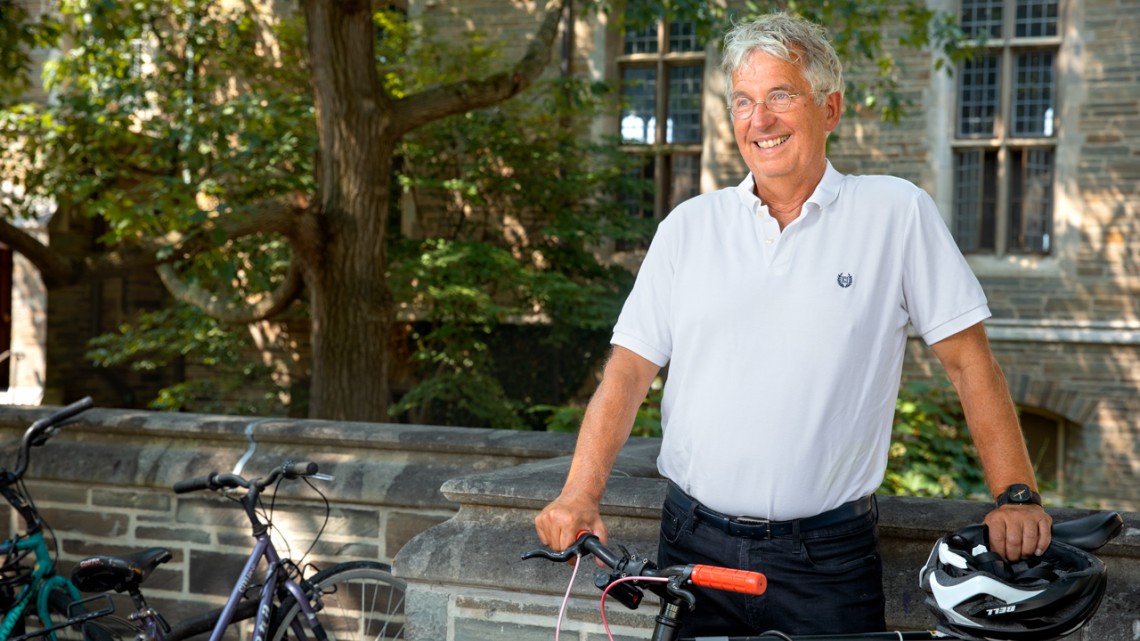
Charlie Van Loan is dean of the faculty at Cornell and a professor emeritus of computer science.
The bicycle and the helmet: One way to frame the ‘first-gen’ discussion
By
A recent news story clarified my thinking around the first-generation student experience. The article was about NBA star LeBron James’ school for at-risk children and how every third- and fourth-grader there – and there are hundreds – gets a bicycle and a helmet. The basketball great never forgot his Akron, Ohio, childhood and the pivotal role that two-wheeled transportation played in the formation of his character and outlook, as he told The Wall Street Journal:
“Everything I do comes from my childhood, from my growing up. … A bicycle, for me, was the only way to get around the city. If I wanted to meet some of my friends, travel across the city, go to school, play basketball ... the bicycle was the way I got around.”
The bicycle took LeBron to different neighborhoods and different cultures and, for the first time, he met white kids:
“I got an opportunity to see them and learn about them and they got an opportunity to learn about me, and we became very good friends.”
It’s a moving story about the reciprocal acquisition of empathy with messages that resonate with Cornell’s growing commitment to first-gen students.
So let’s think broadly – and metaphorically – when we think about bikes, learning to ride, risk and taking chances.
The bike. Cornell offers the incoming freshman a 10-speed and the chance to explore distant neighborhoods. The catch is that you must be able to pedal, balance and shift gears at the same time and at a level that you have probably never experienced before. Overcoming the fear of taking a tumble is essential. This is all about confidence, and confidence always takes a hit when you step into a new academic environment. The hit can be debilitating if there are no loved ones around to explain the college environment in a way that says, “I know from experience that you can do it.” The faculty can do a great deal to compensate, but as successful navigators of the system themselves, the faculty sometimes have to be reminded that they did not become accomplished 10-speeders without the help and encouragement of others.
The helmet. Here, the problem is “I don’t think I need one.” Forces of human nature are still at work hindering the use of any kind of safety net. Pride, peer pressure and a sense of invincibility can get in the way. The challenge for Cornell is to design services that are well-received and effective. A program that does too much will come across as paternalistic. Too little will come across as uncaring. Adventuresome faculty who wear helmets can help strike the right balance, especially if they are willing to share their own experiences and wisdom.
Every first-gen story is unique. Mine started at the University of Michigan in the mid-1960s. The first-semester tuition bill was only $174. The taxpayers of Michigan had a ’60s vision, and that vision made first-generation education possible for me and thousands of others. I will never forget that.
Soon after I finished my Ph.D. in 1973, my mother, who was denied access to college because of the Depression, World War II and other reasons, started taking courses at Manatee Community College in Florida. She earned an associate of arts degree in 1978, proving that it is technically possible for a first-gen parent to have a first-gen child! I am as proud of my mother as I know she was of me.
Experience with graduate education at Cornell for 40-plus years taught me that first-gen dynamics also apply to research students. “Imposter syndrome” is more pronounced at this level because self-doubt and thesis work typically go hand in hand. Being the first in a family to enroll in a graduate program can be as unnerving as being the first in a family to enroll in an undergrad program. Our first-gen programs should reflect this reality.
Many years of reading freshman applications have made me a true believer in need-blind admissions. It’s all about finding “diamonds in the rough” and following up with a plan that builds empathy between first gens and other gens. That’s our version of the LeBron bicycle initiative.
Charlie Van Loan is dean of the faculty at Cornell and a professor emeritus of computer science. He received his B.S., M.S. and Ph.D. degrees in mathematics from the University of Michigan.
Media Contact
Get Cornell news delivered right to your inbox.
Subscribe